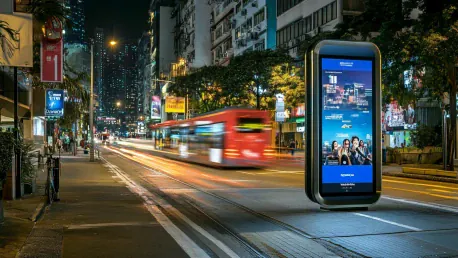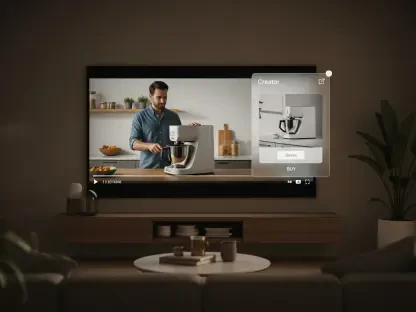In the rapidly evolving landscape of Programmatic Digital Out-of-Home (PDOOH) advertising, the need for independent verification emerges as a critical factor in ensuring transparency and accountability. Nick Parker, Global President of Veridooh, highlights the pressing necessity of independent verification for maintaining advertiser trust. Unlike other programmatic channels such as online and Connected TV (CTV) advertising, PDOOH currently lacks standardized verification practices. This gap poses a significant challenge for advertisers and agencies seeking to navigate the complexities of the digital out-of-home ecosystem effectively, impacting their confidence and investment in the medium.
The Necessity of Independent Verification
Independent verification serves as a cornerstone for transparency and accuracy in PDOOH advertising. Without standardized practices, advertisers face the risk of misreporting and ad fraud, which can derail their advertising objectives and undermine the perceived value of their investments. Trust remains a pivotal element in the growth and sustainability of PDOOH, and independent verification is essential in fostering that trust. By implementing rigorous verification protocols, agencies can ensure the data they present is both accurate and reliable, thus enhancing their clients’ confidence in PDOOH campaigns.
Moreover, the restructuring of agency operations reflects the growing importance of verification. Some agencies are integrating OOH specialists into their broader teams, while others outsource to independent entities to bring expert oversight into the fold. This trend indicates a strategic shift towards reinforcing the credibility of PDOOH through external verification. When major holding groups involve their programmatic agency teams in PDOOH buys, it emphasizes the necessity of robust verification mechanisms to secure the efficacy and trust in their advertising efforts.
Barriers to Adoption and the Path Forward
Despite its evident benefits, the adoption of independent verification in PDOOH faces several obstacles. One major barrier is the lack of awareness among advertisers regarding the availability and importance of verification services. Many advertisers remain unaware of the tools and services that can enhance the accuracy and trustworthiness of their PDOOH campaigns. Furthermore, limited budgets allocated to PDOOH can hinder the investment in additional verification services, especially when advertisers are already navigating the learning curve of integrating PDOOH within their omnichannel programmatic strategies.
Agencies and advertisers must work collaboratively to overcome these barriers by prioritizing education and awareness. By highlighting the risks of unverified campaigns—such as not meeting objectives and potential erosion of trust—clients can better understand the value of investing in verification. Additionally, as PDOOH continues to mature, agencies can advocate for verification as an industry standard, thus creating a normative expectation for verified, transparent advertising practices.
The Risks of Neglecting Verification
The consequences of not adopting independent verification are substantial. Agencies risk running ineffective campaigns that fail to meet clients’ objectives, resulting in a potential loss of trust. If issues within campaigns are identified by clients before the agency flags them, the relationship can suffer significant damage. Trust, once broken, is challenging to rebuild and can lead to clients demanding verification services or seeking out agencies that prioritize such measures. Additionally, unverified campaigns contribute to wider issues such as ad fraud and misreporting, which can undermine the entire industry’s credibility.
The stakes are high for agencies in ensuring the success and transparency of their PDOOH campaigns. By proactively adopting independent verification, agencies can offer their clients a reliable and trustworthy service, ultimately safeguarding their reputation and client relationships. The proactive integration of verification into the campaign lifecycle demonstrates a commitment to high standards and can differentiate an agency in a highly competitive market.
The Benefits of Embracing Verification
Conversely, the advantages of implementing independent verification are numerous and impactful. Verified campaigns provide measurable value, which in turn fosters repeat investments from clients. The trust established through transparent and accurate reporting can generate a positive growth cycle: increased trust leads to higher spending, driving further advances and investments in PDOOH. Agencies that showcase their expertise by bringing such innovations to clients can fortify their competitive edge and build long-lasting partnerships.
Furthermore, the adoption of independent verification has broader industry implications. It sets a benchmark for quality and accountability, encouraging other players in the market to follow suit. As verification becomes normative, the overall integrity and effectiveness of PDOOH are strengthened, attracting more advertisers and increasing the medium’s market share. Agencies leading the charge in verification will not only shape the future standards of PDOOH but also benefit from the growing trust and investment in this dynamic advertising channel.
Shaping the Future of PDOOH
In the rapidly changing landscape of Programmatic Digital Out-of-Home (PDOOH) advertising, the call for independent verification stands out as vital for ensuring transparency and accountability. Nick Parker, Global President of Veridooh, emphasizes the crucial role of independent verification in maintaining the trust of advertisers. Unlike other programmatic channels such as online and Connected TV (CTV) advertising, PDOOH currently lacks standardized verification protocols. This lack of uniform practices presents a significant hurdle for advertisers and agencies striving to navigate the complex digital out-of-home environment effectively. Without these standardized measures, advertisers face challenges that affect their confidence and willingness to invest in PDOOH. Establishing these verification standards could foster greater trust among advertisers and streamline their efforts within this promising medium. By bridging this gap, the PDOOH industry could see enhanced investment and a stronger overall ecosystem.









